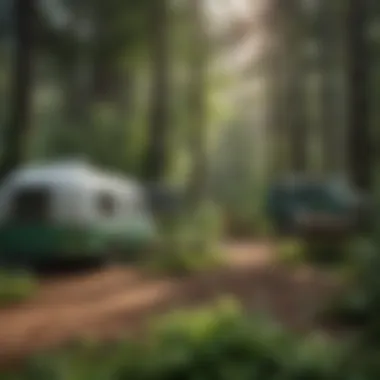Explore North Shore Camping: Unique Adventures Await


Overview of the Topic
When it comes to North Shore camping, the experience is as vast as the shimmering waters of Lake Superior. This area isn't just about setting up camp; it’s a gateway into an ecological treasure trove that invites both adventure and introspection. Here, you find a unique blend of towering pines, rugged cliffs, and the soothing sounds of waves lapping against the shore—all begging you to soak in their beauty.
The North Shore, particularly of Lake Superior, is a region steeped in natural significance and cultural heritage. It serves as a vital habitat for various species, both terrestrial and aquatic. Camping in this area allows one to interact with diverse ecosystems while enjoying the serenity of nature. However, with this privilege comes the responsibility of ensuring that these stunning landscapes remain unspoiled for future adventurers.
Key Natural Resources and Environmental Issues
In terms of natural resources, the North Shore is revered for its rich biodiversity and pristine waters. However, the increasing popularity of camping, coupled with climate change, poses significant challenges.
- Water Quality: Lake Superior's water, once pristine, is increasingly threatened by runoff pollutants, invasive species, and climate change, which affect both wildlife and human health.
- Habitat Disruption: Increased foot traffic can lead to soil erosion and damage to flora, creating a delicate balance that nature struggles to maintain.
The joy of camping in these woods invites reflection on these challenges. Understanding the ecological importance of responsible camping practices can help mitigate these issues, ensuring that our time spent in nature is harmonious with the environment.
Background Information on the Significance of the Topic
Camping on the North Shore is not just about personal enjoyment; it connects us to the broader themes of sustainability and conservation. Many who venture here are drawn not only to its scenic beauty but also to the opportunity to engage with nature in a meaningful way. This region has become increasingly popular among conservationists and casual campers alike, highlighting the need for an awareness of responsible practices.
Camping here offers an invaluable chance to witness ecosystems firsthand, understand the implications of human actions, and participate in their preservation. By educating ourselves and others about these critical issues, we can contribute to a more sustainable outcome for both the landscape and the creatures that inhabit it.
"The North Shore is a remarkable reminder that nature and humanity thrive best in a balanced partnership."
In summary, North Shore camping is an enchanting experience that brings both joy and awareness. It's an invitation to embrace the wilderness while considering our duties as stewards of the land. This guide will further explore the popular destinations, preparation tips, and sustainable practices to enrich your camping experience on the North Shore.
Prelude to North Shore Camping
Camping along the North Shore offers not just a retreat into the great outdoors but also a chance to connect with the wild and pristine beauty that characterizes this region. Here, every tent pitched and campfire lit becomes an homage to nature. When one sets foot on the rugged trails or settles beside tranquil lakes, the experience transcends mere relaxation—it's about rejuvenation and a deeper understanding of our environment.
Choosing to camp in this area holds immense significance. The North Shore is home to diverse ecosystems and a rich tapestry of landscapes, from rugged cliffs to serene waterways. Each camping spot, be it nestled in a forest or perched on a lakeshore, allows campers to engage with nature in a manner that's both intimate and profound. Beyond just striking picturesque views, the essence of North Shore camping lies in promoting conservation and respect for the environment.
When discussing the benefits of camping here, several key elements come to light:
- Connection with Nature: Every moment spent outdoors fosters a direct connection with the earth and its creatures.
- Unique Experiences: The North Shore's unique terrain allows for a myriad of activities, from hiking scenic trails to birdwatching.
- Cultural Awareness: Many camping sites carry historical relevance, often pointing towards their significance in local history, especially concerning Indigenous communities.
As camping enthusiasts prepare for their adventure, it is crucial to consider how one's actions impact the delicate ecosystems. This guide aims to instill a sense of responsibility among campers, emphasizing the importance of adopting sustainable practices. After all, the allure of these natural havens should be preserved for future generations to explore.
Overview of the North Shore
The North Shore stretches alongside the Great Lakes, known for its sweeping vistas, lush forests, and unique geological formations. One can find a fascinating diversity of wildlife, including deer, eagles, and various amphibians. The landscape itself is punctuated by state parks, protected shorelines, and private campsites, offering a wide range of accommodations and activities. Whether you’re looking to fish in one of the crystal-clear lakes or simply sit back and soak in the scenery, the North Shore provides an excellent backdrop for camping enthusiasts.
Historical Significance of Camping in the Area
Camping on the North Shore is steeped in history. Indigenous peoples, such as the Ojibwe and Sioux, have long used these lands for sustenance and spiritual renewal. Their practices, deeply intertwined with the natural world, provide a framework for understanding sustainable living. As Euro-American settlers arrived, they too began to appreciate the beauty and bounty of this region, leading to the establishment of campgrounds and trails that many enjoy today.
The narrative of camping here is not just about recreation; it’s also about acknowledging and respecting the history of the land. Campers are encouraged to engage with local history, to learn about the Indigenous heritage, and to recognize the role they play in preserving these stories. Every campfire shared and every tent pitched carries a connection to those who walked these paths before us.
"Camping is more than a chance to unwind; it’s a journey into the threads of history and the natural world woven together in the North Shore."


Popular North Shore Camping Destinations
When it comes to camping along the North Shore, the choices are as varied as the landscapes themselves. This section offers a journey through some of the most sought-after destinations that draw adventurers, families, and solo campers alike. Each location boasts its own unique attributes, making them pivotal components of the North Shore camping experience. Whether you’re in search of serene lakes, rugged trails, or rich ecosystems, these spots provide not just a place to pitch your tent but a gateway to discover the natural beauty and cultural heritage of the area.
Lakeshore Parks and Preserves
The Lakeshore Parks and Preserves along the North Shore are like nature's gems nestled by the water's edge. These areas often feature stunning views, diverse wildlife, and a range of recreational options. Places like Tettegouche State Park and Split Rock Lighthouse State Park are perfect examples.
Visitors can partake in activities such as swimming, fishing, or simply soaking in the peaceful atmosphere. The lush trails reveal breathtaking vistas and access to hidden beaches. Camping here allows you to literally wake up to the sound of waves lapping at the shore, an experience that’s as close to paradise as one could get.
Consider the environmental note; many parks now engage in preservation programs to protect their fragile ecosystems, which adds to the camping experience by promoting awareness about local biodiversity.
National and State Parks
The North Shore is home to several National and State Parks that highlight the region's natural wonders. Judge C. R. Magney State Park and Isle Royale National Park stand out with their dramatic landscapes and abundant flora and fauna. Spending nights under the stars in a place with so much history brings a particular kind of magic.
Within these parks, hiking paths can lead you to breathtaking waterfalls and high cliffs offering panoramic views. The well-marked trails ensure a safe journey, but one should always be prepared by carrying maps or downloading trail guides. While camping here, it's crucial to follow regulations specific to each park. For instance, using designated campsites helps mitigate environmental impact and keeps the wildlife safe.
Private Campgrounds and Retreats
For those who may prefer more amenities and a sense of community, the private campgrounds and retreats along the North Shore offer an alternative to the ruggedness of state parks. Places like Lakeside Lodge and North Shore Campground bring a blend of comfort and nature. Here, you can enjoy amenities such as showers, camp stores, and organized activities—all while still being right in the heart of beautiful scenery.
Private sites often cater to families or larger groups, making it easier to plan events or gather together for meals. However, it's important to consider that these sites may have a slightly different atmosphere—often bustling with friendly chatter and laughter.
"Camping along the North Shore is not just about enjoying the outdoors; it's about connecting with the earth and respecting its stories."
Overall, the sheer variety of destinations available allows for a rich and rewarding camping experience. There’s no need for a crystal ball to see the wide-ranging benefits these locations offer; just a curious spirit and a love for nature.
Environmental Considerations
When immersing oneself in the great outdoors, it's crucial to remember that our actions leave a mark on the very environments we cherish. This section sheds light on environmental implications of camping along the North Shore, emphasizing the interconnectedness of our actions within these unique ecosystems. It's not just about the experience; it's about preserving the land for future adventurers.
Biodiversity and Ecosystems
The North Shore is a tapestry rich in biodiversity, teeming with unique flora and fauna. The coastal area features a blend of forested regions, wetlands, and open waters, each presenting its own ecological niche. The delicate balance of life exemplified in this landscape is not merely an aesthetic pleasure; it plays a critical role in maintaining ecological health.
Camping here allows individuals to witness this myriad of life firsthand. But with that privilege comes responsibility. Understanding local ecosystems aids in recognizing how simple actions can affect wildlife. For instance, trampling on vegetation can lead to soil erosion and loss of habitat. Conscious exploration ensures that these intricate webs of life remain intact.
Sustainable Camping Practices
Sustainable camping practices are not just trends; they are necessary steps towards minimizing our environmental footprint. By adopting them, campers can partake in enjoyment while protecting the delicate ecosystems they visit. Below are some practices that underscore sustainability in camping.
Leave No Trace Principles
The Leave No Trace Principles emphasize responsible outdoor ethics, serving as a framework for minimizing our impact on natural spaces. The core concept is simplicity — it's essentially about leaving the sites as you found them. Each principle focuses on a specific aspect of environmental conservation, from respecting wildlife to planning ahead. The beauty of this concept is its accessibility; it’s not just for seasoned adventurers. Anyone can follow these guidelines.
One standout feature is the emphasis on waste management: campers are encouraged to pack out everything they bring in. Not only does this keep the scenery pristine, it also protects wildlife that would otherwise converge on trash. As more campers adhere to these principles, they contribute to a larger movement towards preserving our treasured landscapes.
Minimizing Campfire Impact


Campfires have an undeniable charm, drawing people together while adding warmth to chilly evenings. However, they can also wreak havoc on the environment if not managed properly. Minimizing campfire impact means opting for established fire rings and ensuring fires are fully extinguished before leaving.
Furthermore, considering alternatives like portable camping stoves can significantly reduce the strain on local wood resources. By choosing when and how to start a fire judiciously, campers can enjoy the warmth while safeguarding the environment. This balance is key; the flicker of a flame shouldn’t come at the expense of the surrounding biodiversity.
Wildlife Interaction Guidelines
Respecting wildlife is paramount during any camping venture. The Wildlife Interaction Guidelines offer campers insight into how to coexist with the creatures that make these areas their home. One of the guiding principles is to observe wildlife from a distance and never feed them. This interaction discourages natural foraging habits, causing long-term harm.
Another crucial part of these guidelines is understanding the habitats of local species. For instance, during certain seasons, specific areas may be designated as off-limits due to nesting birds or other sensitive wildlife activities. By abiding by these protocols, campers not only protect individual species but also contribute to the overall ecological balance.
"The earth does not belong to us; we belong to the earth."
Preparing for Your North Shore Camping Adventure
Preparing for a camping trip along the North Shore isn’t just about packing your bags and hitting the road; it’s about setting the stage for an adventure that connects you with nature while ensuring safety and enjoyment. The unique characteristics of this area, with its stunning landscapes and the possibility of unpredictable weather, highlight the need for thoughtful preparation. Delving into the specifics of gear, understanding weather patterns, and prioritizing health and safety can significantly enhance your experience. By being well-prepared, you can focus more on the breathtaking views and the serenity of the great outdoors rather than on unforeseen challenges.
Choosing the Right Gear
When it comes to camping, the right gear can be the difference between a delightful escape and a strenuous ordeal. The North Shore’s environment demands thoughtful selection of items that suit both comfort and functionality. Let’s break down some key categories of gear that are essential for a hassle-free experience.
Tents and Sleeping Systems
A good tent isn’t just shelter; it’s your home away from home in the wild. When choosing a tent, consider weather resistance and size. A tent with a rainfly is crucial in the North Shore’s variable climate. Also, if you’re with a family or group, look for larger models that accommodate everyone.
For sleeping, investing in a quality sleeping bag that is rated for the temperatures you may encounter will ensure a good night’s rest. Additionally, a sleeping pad can provide insulation and cushion for a more comfortable sleep. Choosing the right tent and sleeping system improves not only rest but also overall enjoyment of your trip.
Hiking and Navigation Tools
Hiking through the North Shore isn’t just about the trail; it’s about knowing where you are and where you're headed. A good compass and a detailed map of the area can prevent you from wandering off course. Incorporating a GPS device or app adds an extra layer of security.
The lightweight nature of portable navigation tools makes them a popular choice for adventurers. Furthermore, some hiking apps let you download maps, a handy feature where signal may falter. Well-thought-out hiking and navigation tools can lead to discovering those hidden gems without the stress of losing your way.
Cooking and Food Storage Equipment
Eating well while camping is essential, and so is keeping your provisions safe from wildlife. A portable stove, like the Coleman Gas Camping Stove, offers a reliable cooking option when fires aren’t feasible. Cast iron skillets are also an excellent choice due to their durability and ability to retain heat well.
Storage is equally important. Utilizing bear canisters in this area is not just advisable, it's a necessity to keep food secure from curious critters. Proper cooking and food storage equipment mean you can enjoy healthy meals amidst nature while ensuring your food supply remains undisturbed.
Understanding Local Weather Patterns
The North Shore showcases a range of climatic conditions, and understanding these will help you pack accordingly. Generally, summers can be warm, while winters dip into the chilling cold, occasionally even bringing in snow.
Knowing the potential for rain or extreme winds can influence your gear selections and daily plans. Check local forecasts leading up to your trip and during your stay. It’s often said that failing to prepare is preparing to fail, and this rings especially true in a region known for its unpredictability.
Health and Safety Precautions
Safety should always be at the forefront of any outdoor adventure. The aim is to enjoy the tranquility of nature while being prepared for any risks.
First Aid Kits
A well-equipped first aid kit can make a world of difference if an unexpected injury occurs. This kit should include essentials like antiseptic wipes, adhesive bandages, and necessary medication tailored for you and your group's needs. They can be the unsung heroes of your trip, ensuring smooth sailing through small accidents.
Having a comprehensive first aid kit means peace of mind as you navigate through your adventure.
Insect and Wildlife Safety
The beauty of the North Shore extends to its diverse wildlife, but it also comes with the need for awareness. Invest in insect repellent and ensure that your campsite is well-placed to avoid attracting wildlife. Knowing the best practices for interacting with animals, such as avoiding food in tents, can mitigate risks significantly.
Security around wildlife can enhance your enjoyment of observing them from a distance without any close encounters.


Hydration and Food Safety
Proper hydration is key when camping, especially under the sun. Carrying a lightweight, durable water filter or purification tablets helps ensure clean water is always at hand. Stay mindful of food spoilage, especially during warm days; using insulated containers can keep perishables fresh longer. This facet of health and safety allows you to focus on where you’re going and what you’re experiencing without the worry of dehydration or spoiled food impacting your adventure.
Preparing for your North Shore camping adventure is more than just a checklist. It’s about equipping yourself to create memories, enjoy the great outdoors, and traverse the beauty that this picturesque landscape has to offer.
Cultural Insights and Local Communities
Understanding the fabric of local cultures and communities along the North Shore is paramount to enhancing one's camping experience. This region is more than just scenic views and nature trails; it's a diverse tapestry woven with stories of indigenous peoples and local residents. Their narratives provide critical insights into sustainable practices, local history, and an appreciation for the natural world, which can transform a simple camping trip into a meaningful journey.
With a mix of historical backgrounds and modern-day practices, appreciating these cultural elements not only enriches the experience but also fosters respect for the land and its people. A deeper understanding of the communities enables campers to engage in responsible camping practices, ensuring that their presence has a positive impact. Here are key aspects to consider:
- Preserving Indigenous Knowledge: Understanding the customs and traditions of indigenous peoples can offer invaluable information on how to coexist harmoniously with nature. This knowledge often includes sustainable resource management and conservation techniques that have been honed over generations.
- Building Relationships: Campers who seek connection with local communities often find themselves welcomed with open arms. These interactions can form lasting friendships and alliances, forging a sense of belonging and mutual respect in the shared enjoyment of the landscape.
- Cultural Events and Festivals: Engaging in local events allows for immersion into the community’s traditions. Participating in festivals or celebrations not only supports the local economy but also enriches one’s understanding of the cultural significance of the area.
Indigenous Heritage
The North Shore is home to several indigenous groups, each with its own rich history and connection to the land. Acknowledging this heritage is essential, as it speaks to the deep-rooted relationship between these communities and their environments. Indigenous people often possess intricate knowledge regarding ecological balance, seasonality, and biodiversity.
To honor this heritage, consider the following practices:
- Learn Their Stories: Take part in guided tours or educational programs offered by local tribes. These can be eye-opening experiences filled with history and perspectives on land use that might contrast modern practices.
- Respect Sacred Spaces: Many areas along the North Shore hold spiritual significance for indigenous groups. Understanding and respecting these places is crucial for cultural preservation.
- Support Indigenous Businesses: Whether it’s through craft purchases or guided tours, supporting indigenous entrepreneurship aids in the sustainability of local communities.
Community Engagement and Support
Local communities thrive when visitors show respect and consideration. Engaging with these communities means more than just passing through; it's about making an effort to contribute positively. Campers can benefit from:
- Volunteering: Many local organizations welcome help during the busy season. This can be a rewarding way to connect with the community and understand their conservation efforts firsthand.
- Supporting Local Markets: Shopping at farmers' markets or local craft fairs strengthens the local economy. It creates a symbiotic relationship between visitors and residents, ensuring everyone benefits from the trip.
- Joining Local Conservation Efforts: Participate in cleanup initiatives or local conservation projects. Such involvement not only leaves the environment in better shape but also builds rapport with community members who share a similar passion for preserving the North Shore.
"Taking the time to appreciate and engage with the local culture transforms a camping outing from a simple escapade into an enriching experience that respects the land and its people."
Engaging with the meaning and history that envelops the North Shore ensures a camping experience rooted in respect and appreciation. As you prepare for your adventure, remember the importance of cultural insights and becoming a supportive part of the local community.
Closure
As our exploration of North Shore camping draws to a close, the significance of this topic cannot be overstated. This isn’t merely about pitching a tent beneath a sprawling sky or roasting marshmallows by a glowing campfire; it delves into the intricate relationship we share with nature and the responsibility that comes with it. Each camping experience reaffirms our connection to the land and challenges us to tread lightly, ensuring that future generations can bask in the same natural beauty.
Reflecting on the Camping Experience
There's something to be said for the quiet of the wilderness that invites reflection. When camping in the North Shore, the sprawling forests, serene lakes, and rugged cliffs offer more than just scenic views. They present an opportunity for personal growth and introspection.
In the midst of nature's splendor, it becomes easier to ponder life’s big questions, far from the noise of everyday life. Consider how camping can foster resilience. When you face the unexpected, such as a surprise rainstorm or a stubborn campfire that won’t start, you learn to adapt and persevere. These moments provide a unique chance to build character and leave you with stories to share for years to come.
Moreover, connecting with fellow campers often breeds a sense of community. You share meals, teamwork through challenges, and return home with not just memories but friendships that might just last a lifetime. It’s these moments that pack your heart with warmth and cultivate gratitude for the simple joys.
The Future of North Shore Camping
Looking ahead, the future of North Shore camping stands at a crucial juncture. As outdoor enthusiasts grow in number, so does the pressure on these delicate ecosystems. Sustainability must be at the forefront if camping is to thrive in harmony with nature.
Consider the following essential aspects for future camping endeavors:
- Environmental Education: Encouraging campgrounds to offer educational programs can raise awareness about local wildlife and ecosystems, guiding campers to respect and protect their surroundings.
- Innovative Practices: Utilizing renewable energy sources, such as solar-powered sites, could minimize the impact on the environment. Moreover, compostable materials for camping gear might soon become the standard.
- Community Engagement: Fostering local partnerships that involve indigenous communities ensures that traditional knowledge and conservation methods are honored and shared.
Campsites that prioritize sustainable practices not only safeguard our environment but also enhance the quality of the camping experience. As we move forward, it's vital to commit to best practices and collective responsibility—after all, it’s in protecting those stunning landscapes that we preserve a legacy of adventure for tomorrow’s explorers.
"The future belongs to those who believe in the beauty of their dreams."



